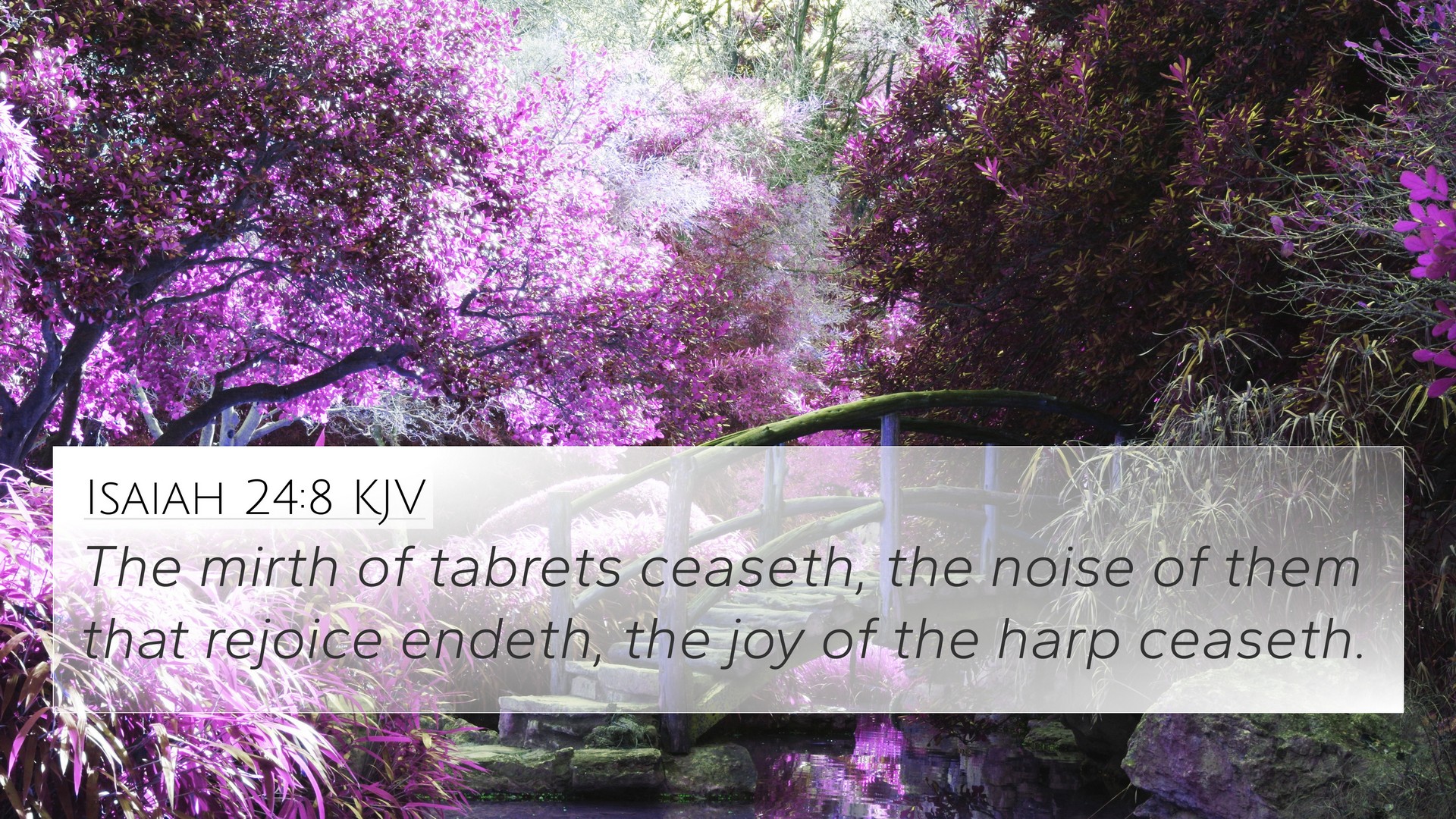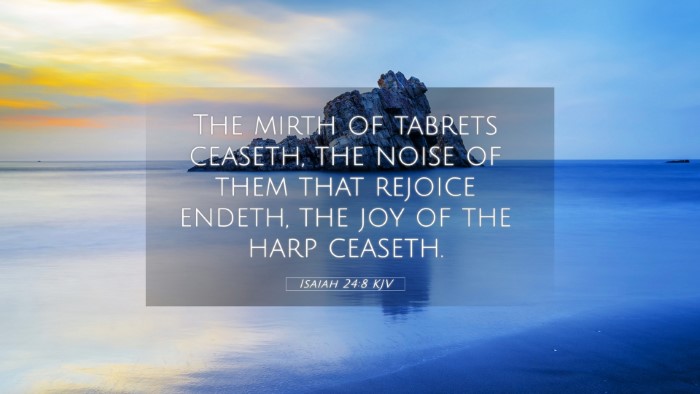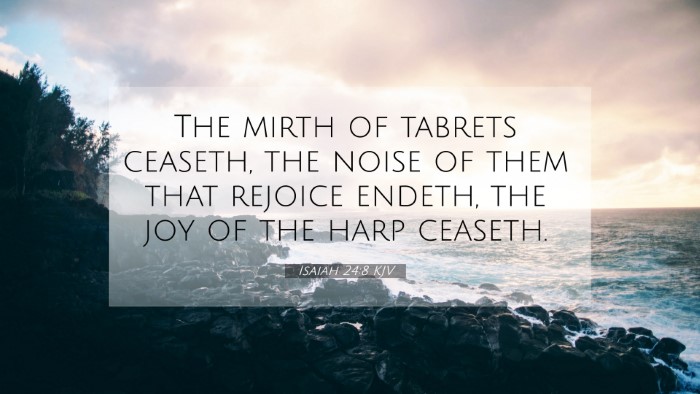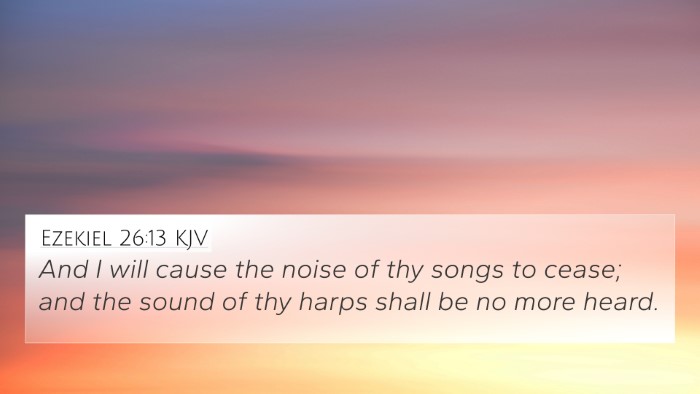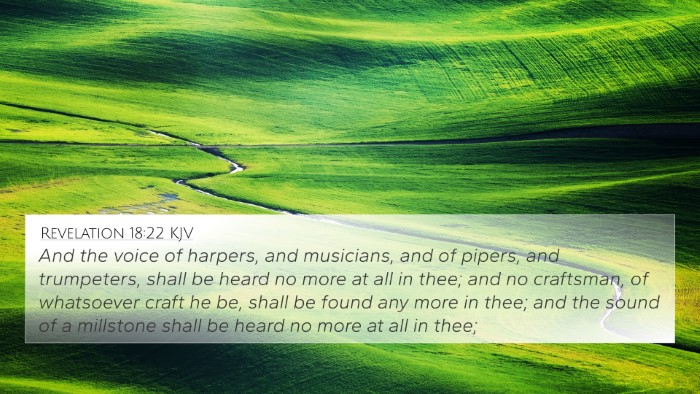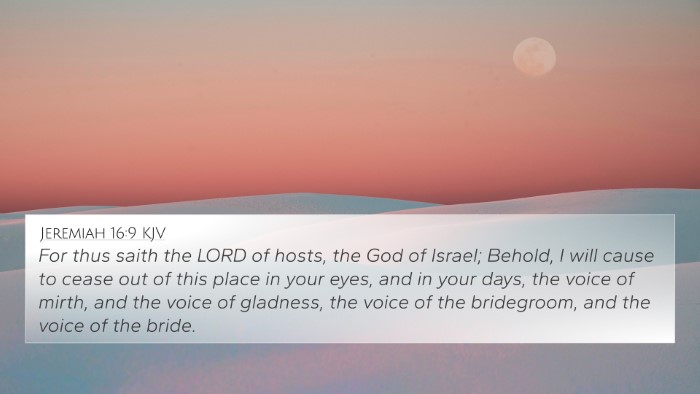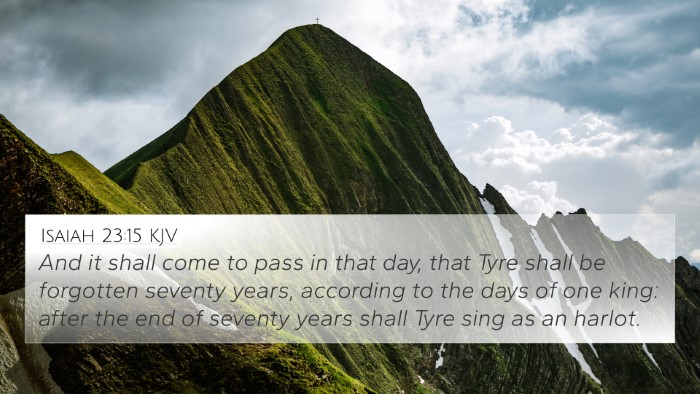Understanding Isaiah 24:8
Isaiah 24:8 reads: "The mirth of the tambourines ceaseth, the noise of them that rejoice endeth, the joy of the harp ceaseth." This verse symbolizes the end of festivities and joy, reflecting the severe judgment upon the earth due to its corruption and disobedience to God's ways. In this analysis, we will explore the meaning of this passage and its connections to other scripture through cross-referencing and thematic evaluations.
Contextual Analysis
The context of Isaiah 24 highlights a prophecy of destruction and desolation resulting from the people's sin. As observed in Matthew Henry's Commentary, this chapter outlines the calamities that shall befall the earth due to the transgressions of its inhabitants. Similarly, Albert Barnes emphasizes that Isaiah presents a universal scope of judgment, which serves not only Israel but extends to all nations. The cessation of joy and music is indicative of the sorrow and despair that come with divine judgment.
Thematic Connections
The theme of joy turning into sorrow is prevalent throughout the scriptures. The joy associated with sinful revelry is transient, as seen in this verse. As Adam Clarke notes in his commentary, the verse serves as a crucial turning point—a depiction of a deeper spiritual failing among the people. Thus, identifying the broader thematic connections makes this verse essential for understanding the nature of divine retribution:
- The fleeting nature of worldly joy (Ecclesiastes 2:1)
- The impact of sin on the community's well-being (Isaiah 57:21)
- Consequences of rebellion against God (Jeremiah 25:10)
- The ultimate restoration brought through divine mercy (Revelation 21:4)
Cross-References in the Bible
Isaiah 24:8 connects to a variety of other scriptures, enhancing its interpretation and helping readers grasp its implications. Notable cross-references include:
- Ecclesiastes 2:1: Reflects on the emptiness of pleasure.
- Isaiah 16:10: Describes a time of mourning due to loss.
- Jeremiah 25:10: Prepares the way for the desolation spoken of through Isaiah.
- Lamentations 5:15: Indicates the cessation of joy as a consequence of sin.
- Amos 8:10: Sections on mourning and the end of festivity due to divine judgment.
- Revelation 18:22-23: Portrays the end of music and celebration in fallen Babylon.
- Matthew 24:38-39: Describes the indifference of the people before judgment.
- Zephaniah 3:17: Contrasts the present sorrow with future joy.
- Micah 2:10: Aggravation of conditions leading to loss of joy.
- Isaiah 16:11: Further emphasis on the futility of human joy without God.
Comparative Bible Verse Analysis
Analyzing Isaiah 24:8 comparatively, we can observe how its message interacts with other scriptural accounts. The cessation of joyful sounds symbolizes a broader spiritual void created by disobedience to God. For instance:
- In Isaiah 25:8, the promise of the end of death contrasts the despair of 24:8, highlighting future restoration.
- Revelation 21:4 promises that God will wipe away every tear, ending sorrow.
- Romans 8:18 expresses hope amidst present suffering akin to what is described in Isaiah 24.
Tools for Bible Cross-Referencing
To further explore the connections between Bible verses and understand their meanings, various tools can be utilized:
- Bible Concordance: An alphabetical listing of words and their occurrences in scripture.
- Bible Cross-Reference Guide: Offers systematic linking of related verses.
- Cross-Reference Bible Study: Helpful in discovering thematic links between different books.
- Bible Reference Resources: Collections of writings and databases for deeper study.
- Bible Chain References: Methodologies for connecting verses through thematic chains.
User Intent and Learning Paths
For those seeking to dig deeper or find specific cross-references to Isaiah 24:8, the following questions may be useful:
- What verses are related to Isaiah 24:8?
- How do Isaiah 24:8 and Isaiah 25:8 connect?
- What are the similarities between Isaiah 24 and Ecclesiastes 2?
- Which Bible verses support the themes in Isaiah 24:8?
Conclusion
In summary, Isaiah 24:8 serves as a poignant reminder of the fleeting nature of joy derived from sin and the impending consequences of such a lifestyle. Through the analysis of cross-references, thematic connections, and the use of Bible study tools, we can gain a more comprehensive understanding of this scripture's significance within the greater biblical narrative.
